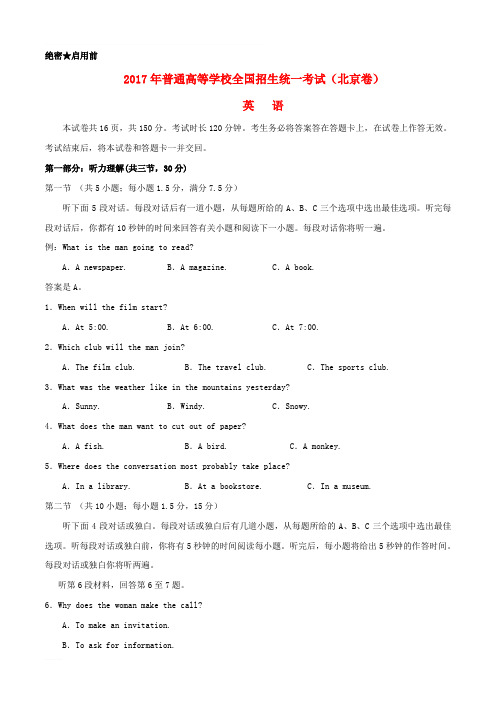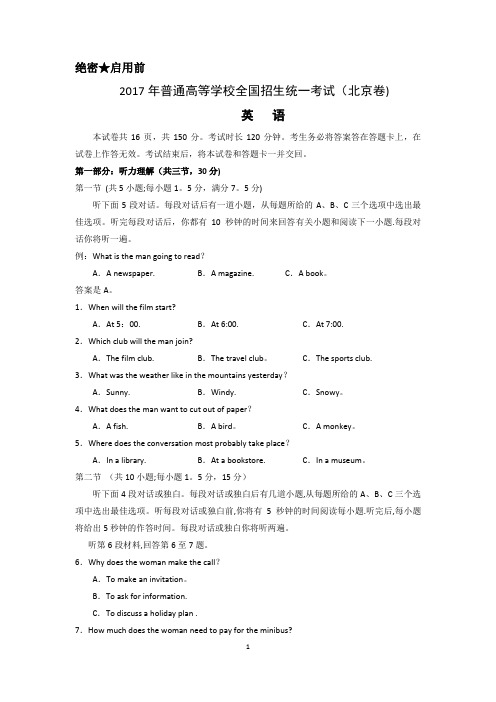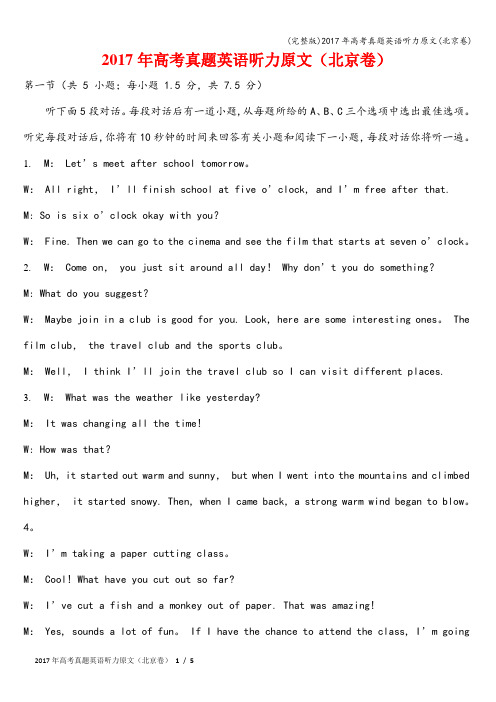2017年高考真题——英语(北京卷) 速递版含答案
2017年普通高等学校招生全国统一考试英语北京卷(附答案)

2017年普通高等学校全国招生统一考试(北京卷)英语本试卷共16页,共150分。
考试时长120分钟。
考生务必将答案答在答题卡上,在试卷上作答无效。
考试结束后,将本试卷和答题卡一并交回。
第一部分:听力理解(共三节,30分)第一节(共5小题;每小题1.5分,满分7.5分)听下面5段对话。
每段对话后有一道小题,从每题所给的A、B、C三个选项中选出最佳选项。
听完每段对话后,你都有10秒钟的时间来回答有关小题和阅读下一小题。
每段对话你将听一遍。
例:What is the man going to read?A.A newspaper. B.A magazine. C.A book.答案是A。
1.When will the film start?A.At 5:00. B.At 6:00. C.At 7:00.2.Which club will the man join?A.The film club. B.The travel club. C.The sports club.3.What was the weather like in the mountains yesterday?A.Sunny. B.Windy. C.Snowy.4.What does the man want to cut out of paper?A.A fish. B.A bird. C.A monkey.5.Where does the conversation most probably take place?A.In a library. B.At a bookstore. C.In a museum.第二节(共10小题;每小题1.5分,15分)听下面4段对话或独白。
每段对话或独白后有几道小题,从每题所给的A、B、C三个选项中选出最佳选项。
听每段对话或独白前,你将有5秒钟的时间阅读每小题。
听完后,每小题将给出5秒钟的作答时间。
2017年普通高等学校招生全国统一考试英语试题(北京卷,精品解析)

绝密★启用前2017年普通高等学校全国招生统一考试(北京卷)英语本试卷共16页,共150分。
考试时长120分钟。
考生务必将答案答在答题卡上,在试卷上作答无效。
考试结束后,将本试卷和答题卡一并交回。
第一部分:听力理解(共三节,30分)第一节(共5小题;每小题1.5分,满分7.5分)听下面5段对话。
每段对话后有一道小题,从每题所给的A、B、C三个选项中选出最佳选项。
听完每段对话后,你都有10秒钟的时间来回答有关小题和阅读下一小题。
每段对话你将听一遍。
例:What is the man going to read?A.A newspaper. B.A magazine. C.A book.答案是A。
1.When will the film start?A.At 5:00. B.At 6:00. C.At 7:00.2.Which club will the man join?A.The film club. B.The travel club. C.The sports club.3.What was the weather like in the mountains yesterday?A.Sunny. B.Windy. C.Snowy.4.What does the man want to cut out of paper?A.A fish. B.A bird. C.A monkey.5.Where does the conversation most probably take place?A.In a library. B.At a bookstore. C.In a museum.第二节(共10小题;每小题1.5分,15分)听下面4段对话或独白。
每段对话或独白后有几道小题,从每题所给的A、B、C三个选项中选出最佳选项。
听每段对话或独白前,你将有5秒钟的时间阅读每小题。
听完后,每小题将给出5秒钟的作答时间。
2017年高考真题——英语(北京卷)详细解析【范本模板】

绝密★启用前2017年普通高等学校全国招生统一考试(北京卷)英语本试卷共16页,共150分。
考试时长120分钟。
考生务必将答案答在答题卡上,在试卷上作答无效。
考试结束后,将本试卷和答题卡一并交回。
第一部分:听力理解(共三节,30分)第一节(共5小题;每小题1。
5分,满分7。
5分)听下面5段对话。
每段对话后有一道小题,从每题所给的A、B、C三个选项中选出最佳选项。
听完每段对话后,你都有10秒钟的时间来回答有关小题和阅读下一小题.每段对话你将听一遍。
例:What is the man going to read?A.A newspaper. B.A magazine. C.A book。
答案是A。
1.When will the film start?A.At 5:00. B.At 6:00. C.At 7:00.2.Which club will the man join?A.The film club. B.The travel club。
C.The sports club.3.What was the weather like in the mountains yesterday?A.Sunny. B.Windy. C.Snowy。
4.What does the man want to cut out of paper?A.A fish. B.A bird。
C.A monkey。
5.Where does the conversation most probably take place?A.In a library. B.At a bookstore. C.In a museum。
第二节(共10小题;每小题1。
5分,15分)听下面4段对话或独白。
每段对话或独白后有几道小题,从每题所给的A、B、C三个选项中选出最佳选项。
听每段对话或独白前,你将有5秒钟的时间阅读每小题.听完后,每小题将给出5秒钟的作答时间。
【北京卷】2017年高考英语试题全解析(Word原卷版)

绝密★启用前2017年普通高等学校全国招生统一考试(北京卷)英语本试卷共16页,共150分。
考试时长120分钟。
考生务必将答案答在答题卡上,在试卷上作答无效。
考试结束后,将本试卷和答题卡一并交回。
第一部分:听力理解(共三节,30分)第一节(共5小题;每小题1.5分,满分7.5分)听下面5段对话。
每段对话后有一道小题,从每题所给的A、B、C三个选项中选出最佳选项。
听完每段对话后,你都有10秒钟的时间来回答有关小题和阅读下一小题。
每段对话你将听一遍。
例:What is the man going to read?A.A newspaper. B.A magazine. C.A book.答案是A。
1.When will the film start?A.At 5:00. B.At 6:00. C.At 7:00.2.Which club will the man join?A.The film club. B.The travel club. C.The sports club.3.What was the weather like in the mountains yesterday?A.Sunny. B.Windy. C.Snowy.4.What does the man want to cut out of paper?A.A fish. B.A bird. C.A monkey.5.Where does the conversation most probably take place?A.In a library. B.At a bookstore. C.In a museum.第二节(共10小题;每小题1.5分,15分)听下面4段对话或独白。
每段对话或独白后有几道小题,从每题所给的A、B、C三个选项中选出最佳选项。
听每段对话或独白前,你将有5秒钟的时间阅读每小题。
听完后,每小题将给出5秒钟的作答时间。
[五年高考]2014年-2015-2016-2017-2018年北京市英语卷高考试题真题卷(含详细答案)
![[五年高考]2014年-2015-2016-2017-2018年北京市英语卷高考试题真题卷(含详细答案)](https://img.taocdn.com/s3/m/c0c4e1403b3567ec102d8aaf.png)
高考试题汇总目录(精心整理)2018年北京卷高考试题word版(含详细答案)2017年北京卷高考试题word版(含详细答案)2016年北京卷高考试题word版(含详细答案)2015年北京卷高考试题word版(含详细答案)2014年北京卷高考试题word版(含详细答案)绝密★启用前2018年普通高等学校招生全国统一考试英语(北京卷)(考试时间:100分钟试卷满分:120分)考生务必将答案答在答题卡上,在试卷上作答无效。
考试结束后,将本试卷和答题卡一并交回。
第一部分:知识运用(共两节,45分)第一节单项填空(共15小题;每小题1分,共15分)从每题所给的A、B、C、D四个选项中,选出可以填入空白处的最佳选项,并在答题卡上将该项涂黑。
例:It’s so nice to hear from her again. _________, we last met more than thirty years ago.A. What’s moreB. That’s to sayC. In other wordsD. Believe it or not答案是D。
1. —Hi, I’m Peter. Are you new here? I haven’t seen you around?—Hello, Peter. I’m Bob. I just _________ on Monday.A. startB. have startedC. startedD. had started2. _________ we don’t stop climate change, many animals and plants in the world will be gone.A. AlthoughB. WhileC. IfD. Until3. _________ along the old Silk Road is an interesting and rewarding experienceA. TravelB. TravelingC. Having traveledD. Traveled4. Susan had quit her well-paid job and _________ as a volunteer in the neighborhood when I visited her last year.A. is workingB. was workingC. has workedD. had worked5. She and her family bicycle to work, _________ helps them keep fit.A. whichB. whoC.asD. that6. During the Mid-Autumn Festival, family members often gather together _________ a meal, admire the moon and enjoy moon cakes.A. shareB. to shareC. having sharedD. shared7. China’s high-speed railways _________ from 9,000 to 25,000 kilometers in the past few years.A. are growingB. have grownC. will growD. had grown8. In any unsafe situation, simply _________ the button and a highly-trained agent will get you the help you need.A. pressB. to pressC. pressingD. pressed9. A rescue worker risked his life saving two tourists who _________ in the mountains for two days.A. are trappingB. have been trappedC. were trappingD. had been trapped10. Ordinary soap, _________ correctly, can deal with bacteria effectively.A. usedB. to useC. usingD. use11. Without his support, we wouldn’t be _________ we are now.A. howB. whenC. whereD. why12. In today’s information age, the loss of data _________ cause serious problems for a company.A. needB. shouldC. canD. must13. They might have found a better hotel if they _________ a few more kilometers.A. droveB. would driveC. were to driveD. had driven14. —Good morning, Mr. Lee’s office.—Good morning. I’d like to make an appointment _________ next Wednesday afternoon.A. forB. onC. inD. at15. This is _________ my father has taught me—to always face difficulties and hope for the best.A. howB. whichC. thatD. what第二节完形填空(共20小题;每小题1.5分,共30分)阅读下面短文,掌握其大意,从每题所给的A、B、C、D四个选项中,选出最佳选项,并在答题卡上将该项涂黑。
(完整版)2017年高考真题英语听力原文(北京卷)

2017年高考真题英语听力原文(北京卷)第一节(共 5 小题;每小题 1.5 分,共 7.5 分)听下面5段对话。
每段对话后有一道小题,从每题所给的A、B、C三个选项中选出最佳选项。
听完每段对话后,你将有10秒钟的时间来回答有关小题和阅读下一小题,每段对话你将听一遍。
1. M:Let’s meet after school tomorrow。
W: All right,I’ll finish school at five o’clock, and I’m free after that.M: So is six o’clock okay with you?W:Fine. Then we can go to the cinema and see the film that starts at seven o’clock。
2. W: Come on, you just sit around all day!Why don’t you do something?M: What do you suggest?W: Maybe join in a club is good for you. Look, here are some interesting ones。
The film club, the travel club and the sports club。
M: Well,I think I’ll join the travel club so I can visit different places.3. W: What was the weather like yesterday?M: It was changing all the time!W: How was that?M: Uh, it started out warm and sunny, but when I went into the mountains and climbed higher, it started snowy. Then, when I came back, a strong warm wind began to blow。
2017年北京高考英语试卷完整版.doc
绝密★启用前2017年普通高等学校全国招生统一考试(北京卷)英语本试卷共16页,共150分。
考试时长120分钟。
考生务必将答案答在答题卡上,在试卷上作答无效。
考试结束后,将本试卷和答题卡一并交回。
第一部分:听力理解(共三节,30分)第一节(共5小题;每小题1.5分,满分7.5分)听下面5段对话。
每段对话后有一道小题,从每题所给的A、B、C三个选项中选出最佳选项。
听完每段对话后,你都有10秒钟的时间来回答有关小题和阅读下一小题。
每段对话你将听一遍。
1. When will the film start?A. At 5:00.B. At 6:00.C. At 7:00.2. Which club will the man join?A. The film club.B. The travel club.C. The sports club.3. What was the weather like in the mountains yesterday?A. Sunny.B. Windy.C. Snowy.4. What does the man want to cut out of paper?A. A fish.B. A bird.C. A monkey.5. Where does the conversation most probably take place?A. In a library.B. At a bookstore.C. In a museum.第二节(共10小题;每小题1.5分,15分)听下面4段对话或独白。
每段对话或独白后有几道小题,从每题所给的A、B、C三个选项中选出最佳选项。
听每段对话或独白前,你将有5秒钟的时间阅读每小题。
听完后,每小题将给出5秒钟的作答时间。
每段对话或独白你将听两遍。
听第6段材料,回答第6至7题。
6. Why does the woman make the call?A. To make an invitation.B. To ask for information.C. To discuss a holiday plan .7. How much does the woman need to pay for the minibus?A. $50.B. $150.C. $350.听第7段材料,回答第8至9题。
高考北京卷英语真题及答案「完整版」(3)
高考北京卷英语真题及答案「完整版」(3)2017年高考北京卷英语真题及答案「完整版」CMeasles(麻疹), which once killed 450 children each year and disabled even more, was nearly wiped out in the United States 14 years ago by the universal use of the MMR vaccine(疫苗). But the disease is making a comeback, caused by a growing anti-vaccine movement and misinformation that is spreading quickly. Already this year, 115 measles cases have been reported in the USA, compared with 189 for all of last year.The numbers might sound small, but they are the leading edge of a dangerous trend. When vaccination rates are very high, as they still are in the nation as a whole, everyone is protected. This is called “herd immunity”, which protects the people who get hurt easily, including those who zxxk can’t be vaccinated for medical reasons, babies too young to get vaccinated and people on whom the vaccine doesn’t work.But herd immunity works only when nearly the whole herd joins in. When some refuse vaccination and seek a free ride, immunity breaks down and everyone is in even bigger danger.That’s exactly what is happening in small neighborhoods around the country from Orange County, California, where 22 measles cases were reported this month, to Brooklyn, N.Y., where a 17-year-old caused an outbreak last year.The resistance to vaccine has continued for decades, and it is driven by a real but very small risk. Those who refuse to take that risk selfishly make others suffer.Making things worse are state laws that make it too easy to opt out(决定不参加) of what are supposed to be required vaccinesfor all children entering kindergarten. Seventeen states allow parents to get an exemption(豁免), sometimes just by signing a paper saying they personally object to a vaccine.Now, several states are moving to tighten laws by adding new regulations for opting out. But no one does enough to limit exemptions.Parents ought to be able to opt out only for limited medical or religious reasons. But personal opinions? Not good enough. Everyone enjoys the life-saving benefits vaccines provide, but they’ll exist only as long as everyone shares in the risks.63.The first two paragraphs suggest that ____________.A.a small number of measles cases can start a dangerous trendB.the outbreak of measles attracts the public attentionC.anti-vaccine movement has its medical reasonsrmation about measles spreads quickly64.Herd immunity works well when ____________.A.exemptions are allowedB.several vaccines are used togetherC.the whole neighborhood is involved inD.new regulations are added to the state laws65.What is the main reason for the comeback of measles?A.The overuse of vaccine.B.The lack of medical care.C.The features of measles itself.D.The vaccine opt-outs of some people.66.What is the purpose of the passage?A.To introduce the idea of exemption.B.To discuss methods to cure measles.C.To stress the importance of vaccination.D.To appeal for equal rights in medical treatment.DHollywood’s theory that machines with evil(邪恶) minds will drive armies of killer robots is just silly. The real problem relates to the possibility that artificial intelligence(AI) may become extremely good at achieving something other than what we really want. In 1960 a well-known mathematician Norbert Wiener, who founded the field of cybernetics(控制论), put it this way: “If we use, to achieve our purposes, a mechanical agency with whose operation we cannot effectively interfere(干预), we had better be quite sure that the purpose which we rea lly desire.”A machine with a specific purpose has another quality, one that we usually associate with living things: a wish to preserve its own existence. For the machine, this quality is not in-born, nor is it something introduced by humans; it is a logical consequence of the simple fact that the machine cannot achieve its original purpose if it is dead. So if we send out a robot with the single instruction of fetching coffee, it will have a strong desire to secure success by disabling its own off switch or even killing anyone who might interfere with its task. If we are not careful, then, we could face a kind of global chess match against very determined, super intelligent machines whose objectives conflict with our own, with the real world as the chessboard.The possibility of entering into and losing such a match should concentrating the minds of computer scientists. Some researchers argue that we can seal the machines inside a kind of firewall, using them to answer difficult questions but never allowing them to affect the real world. Unfortunately, that plan seems unlikely to work: we have yet to invent a firewall that is secure against ordinary humans, let alone super intelligentmachines.Solving the safety problem well enough to move forward in AI seems to be possible but not easy. There are probably decades in which to plan for the arrival of super intelligent machines. But the problem should not be dismissed out of hand, as it has been by some AI researchers. Some argue that humans and machines can coexist as long as they work in teams—yet that is not possible unless machines share the goals of humans. Others say we can just “switch them off” as if super intelligent machines are too stupid to think of that possibility. Still others think that super intelligent AI will never happen. On September 11, 1933, famous physicist Ernest Rutherford stated, with confidence, “Anyone who expects a source of power in the transformation of these atoms is talking moonshine.” However, on September 12, 1933, physicist Leo Szilard invented the neutron-induced(中子诱导) nuclear chain reaction.67.Paragraph 1 mainly tells us that artificial intelligence may .A. run out of human controlB. satisfy human’s real desiresC. command armies of killer robotsD. work faster than a mathematician68.Machines with specific purposes are associated with living things partly because they might be able to .A. prevent themselves from being destroyedB achieve their original goals independentlyC. do anything successfully with given ordersD. beat humans in international chess matches69.According to some researchers, we can use firewalls to .A. help super intelligent machines work betterB. be secure against evil human beingsC. keep machines from being harmedD. avoid robots’ affecting the w orld70.What does the author think of the safety problem of super intelligent machines?A. It will disappear with the development of AI.B. It will get worse with human interference.C. It will be solved but with difficulty.第二节 (共 5 小题;每小题 2 分,共 10 分)根据短文内容,从短文后的七个选项中选出能填入空白处的最佳选项。
2017年北京高考英语试卷与答案(word文档良心出品)
绝密★启用前2017年普通高等学校全国招生统一考试(北京卷)英语本试卷共16页,共150分。
考试时长120分钟。
考生务必将答案答在答题卡上,在试卷上作答无效。
考试结束后,将本试卷和答题卡一并交回。
第一部分:听力理解(共三节,30分)第一节(共5小题;每小题1.5分,满分7.5分)听下面5段对话。
每段对话后有一道小题,从每题所给的A、B、C三个选项中选出最佳选项。
听完每段对话后,你都有10秒钟的时间来回答有关小题和阅读下一小题。
每段对话你将听一遍。
例:What is the man going to read?A.A newspaper. B.A magazine. C.A book.答案是A。
1.When will the film start?A.At 5:00. B.At 6:00. C.At 7:00.2.Which club will the man join?A.The film club. B.The travel club. C.The sports club.3.What was the weather like in the mountains yesterday?A.Sunny. B.Windy. C.Snowy.4.What does the man want to cut out of paper?A.A fish. B.A bird. C.A monkey.5.Where does the conversation most probably take place?A.In a library. B.At a bookstore. C.In a museum.第二节(共10小题;每小题1.5分,15分)听下面4段对话或独白。
每段对话或独白后有几道小题,从每题所给的A、B、C三个选项中选出最佳选项。
听每段对话或独白前,你将有5秒钟的时间阅读每小题。
听完后,每小题将给出5秒钟的作答时间。
- 1、下载文档前请自行甄别文档内容的完整性,平台不提供额外的编辑、内容补充、找答案等附加服务。
- 2、"仅部分预览"的文档,不可在线预览部分如存在完整性等问题,可反馈申请退款(可完整预览的文档不适用该条件!)。
- 3、如文档侵犯您的权益,请联系客服反馈,我们会尽快为您处理(人工客服工作时间:9:00-18:30)。
2017年普通高等学校招生全国统一考试
英语(北京卷)参考答案
第一部分:听力理解(共三节,30分)
第一节(共5小题;每小题1.5分,共7.5分)
1.C 2. B 3. C 4. B 5.A
第二节(共10小题;每小题1.5分,共15分)
6. B 7.B 8.A 9.C 10.A
11. C 12. B 13. A 14. C 15. A
第三节(共5小题;每小题1.5分,共7.5分)
每小题1.5分。如出现拼写错误不计分;出现大小写、单复数错误扣0.5分;如每小题超过
一个词不计分。
16. dictionary 17.Italy 18. Monday/Mon. 19. Acket/ACKET 20.15374
第二部分:知识运用(共两节,45分)
第一节 单项填空(共15小题;每小题1分,共15分)
21.C 22. D 23. B 24.A 25. C
26.B 27.C 28.C 29.D 30.A
31.A 32.D 33.B 34.A 35.B
第二节 完形填空(共20小题;每小题1.5分,共30分)
36. B 37. D 38. C 39. A 40. D
41. B 42. A 43. C 44. D 45. C
46. A 47. A 48. B 49. C 50. B
51. A 52. D 53. B 54. C 55. D
第三部分:阅读理解(共两节,40分)
第一节(共15小题;每小题2分,共30分)
56. B 57. C 58. B 59. D 60. B
61. D 62. B 63. A 64. C 65. D
66. C 67. A 68. A 69. D 70. C
第二节(共5小题;每小题2分,共10分)
71. C 72. E 73. F 74. G 75. B
第四部分
第一节
Dear Jim,
I’m happy receive your letter and know you’re coming to China.
Of the two trips to the Yangtze River and Mount Tai, both are highly recommended. Personally, I
prefer the your along the Yangtze, the longest river and one of the mother rivers of Chinese
civilization. You can learn a lot about the history of China and Chinese people. Moreover, the
scenery along the river is amazing, with many well-known sightseeing spots. That’s why I think
the trip along the Yangtze will be a better choice.
Hope you’ll have a good time in China.
Yours
Li Hua
第二节(20分)
一、内容要点:
1. 讨论分工 2. 收集素材 3. 编辑制作 4. 放映视频
二、One possible version:
Graduation finally came. My classmates and I decided to do something. After a heated discussion,
we agreed on making a video to record our experiences at school.
Material collecting took us a whole week, during which we interviewed our teachers and took
pictures of every aspect of school life. The editing part after that was tough. We debated over
what to put into the video. Some compromises were unavoidable, but the video turned out
perfect. Several days later, when the video was played on the graduation ceremony, it was well
received. The students and teachers shared a great time. That surely gave us a great sense of
achievement.
